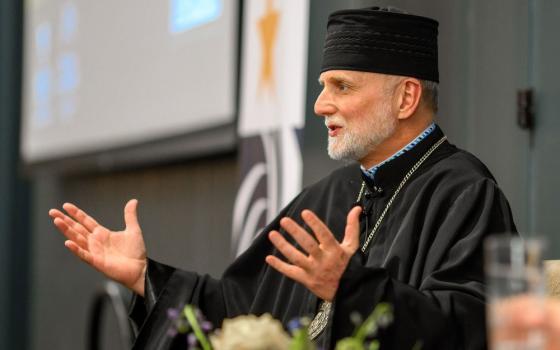When the scholar in Luke 10 asks Jesus, "Teacher, what must I do to attain eternal life?", he asks a question parents would be wise to ask their kids before sending them off on "the pursuit of happiness." Eternal life then, and perhaps now, meant happiness, salvation, fulfillment, success.
Ponder for a second: What does the word success really mean to you? What it means to you is what it will mean to them.
I've asked students that for 50 years -- in high schools and colleges in the U.S., in England, in Australia -- and the answers never varied. Never. It's amazing.
First, the answers are -- always -- so soft as to be almost inaudible, like some awful secret. Second, every student response is sublimely vague: "To, uh, achieve your, like, goals ... you know, like, be happy ... doing your best."
At that age, I don't expect them to have some specified plan for success, but one simply can't achieve a vague goal.
After 11 years of what they call Catholic brainwashing, not a single one (out of 5,000 or 6,000) has ever said, "To be like Jesus Christ." Never.
No one has ever even said, "To be a good spouse and parent" or even "To be a good person."
And only rarely does one have the guts to say, "Money!" -- even though the subsequent discussion reveals they presume they'll be living at least as well as their parents 10 years out of college. They are suffused with hopes that won't get them on the subway.
Jesus answers the question of what success means, not just in the story of the good Samaritan but especially when he describes the only question at the Last Judgment to discern whether our life was worth living: "I was hungry, I was thirsty. I was the one they called 'loser,' 'slut,' 'nerd,' 'fag.' What did you do about that?"
So I told the students a story of my own yielding to that truth, long after the event itself. I came home one day and my mom informed me that I was taking Eileen Reilly to her senior ball.
I'd gone to grade school with Eileen, so I instantly said, "No!" Frizzy hair, granny glasses, not a bump on her, and as communicative as a cemetery statue.
But saying no to my mom was like refusing Cleopatra or Catherine the Great. So, of course, I took Eileen. I didn't have my night license, so my dad -- oh, the horror! -- had to drive us.
Then it got worse. We got there on time! I tried every conversational ploy from the band to the causes of World War I. Nada.
My pals started to arrive, elbowing one another and nodding toward us. Then it got interminable. I could dance. Eileen, well, she couldn't. So, at about 11:30 p.m., I said, "Well, it's getting late." And I called my dad to take us home.
The kids in the class always laughed at my confession. Smart mouth Fr. O'Malley trapped! Delicious!
Then I pulled the pin. "What a selfish sonofabitch I was." Eyes popped.
Never once, I told them -- not in the dreadful weeks before or on the awful evening itself or over the next few years -- never once did I think of Eileen. It was surely her first-ever date, her first corsage and prom dress, her first date away from her prudish parents and unsmiling siblings.
And all I thought of was my own wretchedness. Me, the altar boy, the sin-free, gold-star, Pharisee Catholic. Then one day it hit me and I prayed she would have mercy on me.
Since then, I have directed about 50 musicals, and I always made sure there were a half-dozen Eileens in the chorus. And whenever I got a painfully shy boy in class, I promised myself I'd make him feel important, the way Oprah does with every guest.
I learned the hard way that the only important question about success in our lives is: Was I kind?
I don't know how parents can help their kids become attentive to the unattractive, the needy, or inculcate the empathy that resonates with their pain and the kindness that brings compassion into their faces and voices and fingertips. But I know that without it, Jesus doesn't stand a chance.
I'm grateful to Eileen Reilly for teaching me. Hebrews says, "Entertain strange people, for by so doing some have entertained angels without knowing it."
I'd truly hate to insult an angel again.
[Jesuit Fr. William J. O'Malley was known throughout the world for a little while as the kindly priest at the end of "The Exorcist" who made Linda Blair smile. He taught young people for more than 50 years, and is now retired.]



